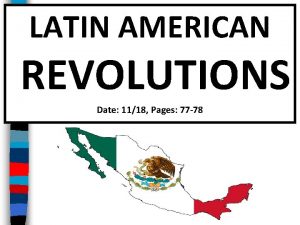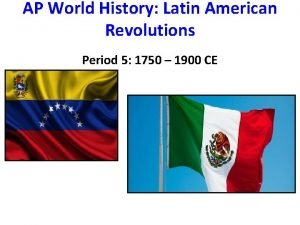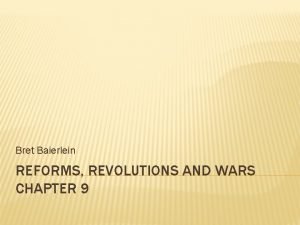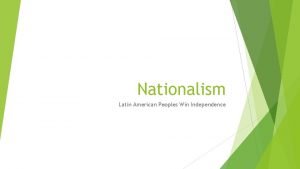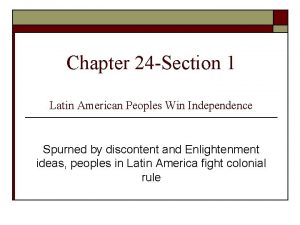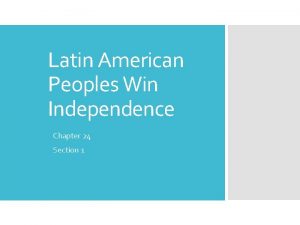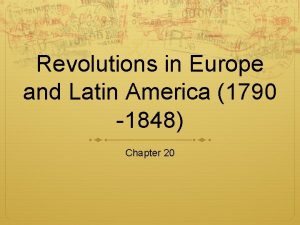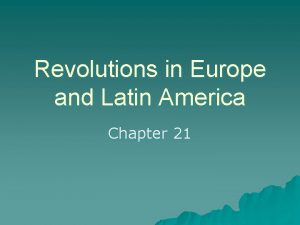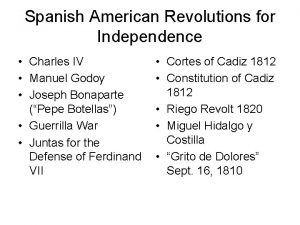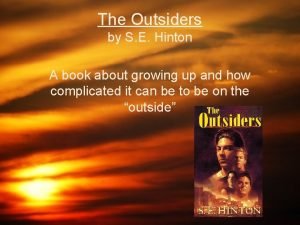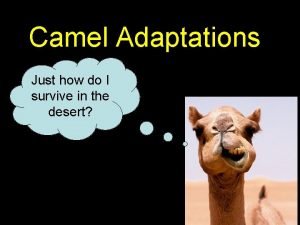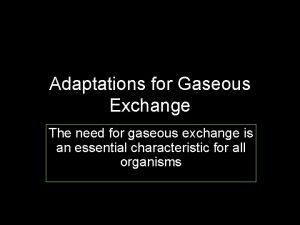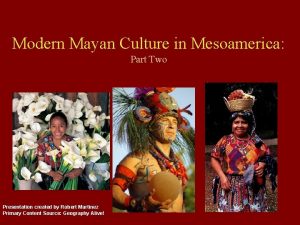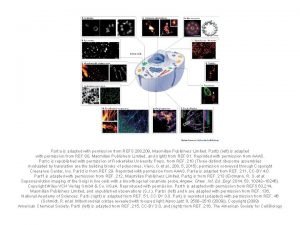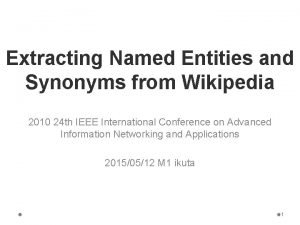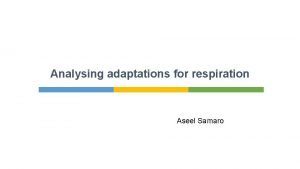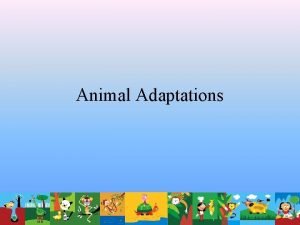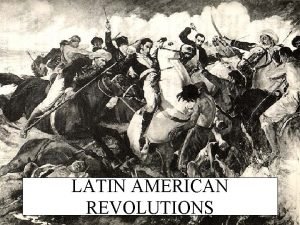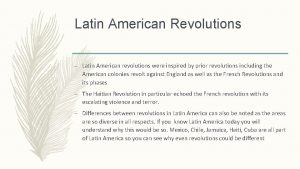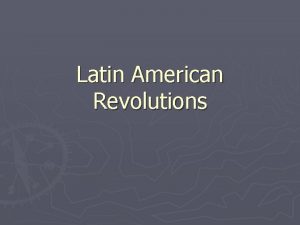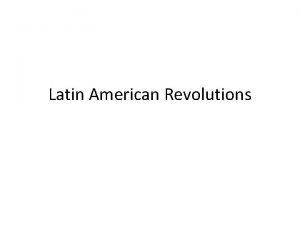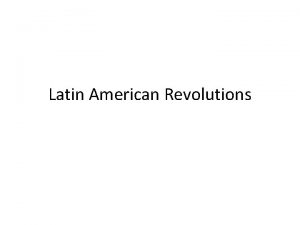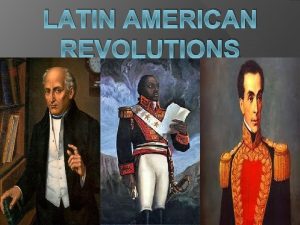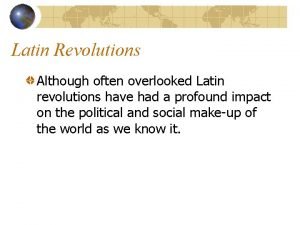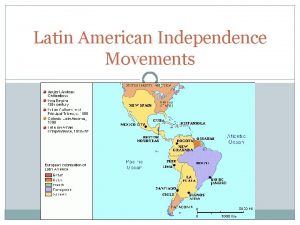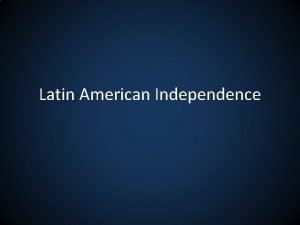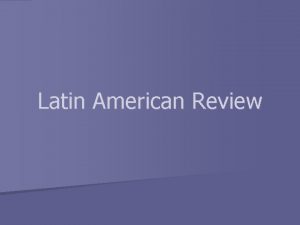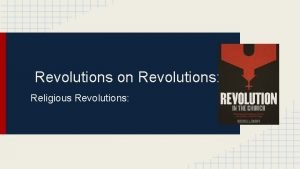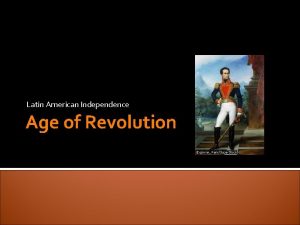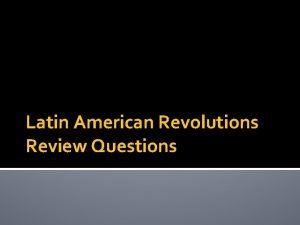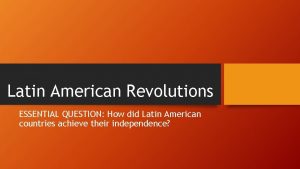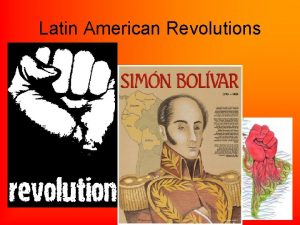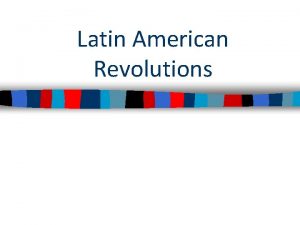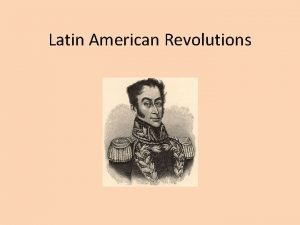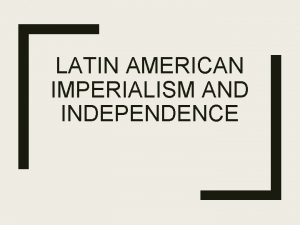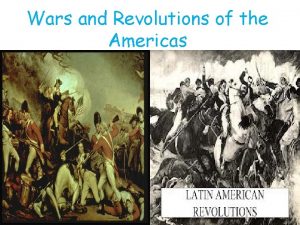Latin American Independence Revolutions Wars Independence Adapted from





















- Slides: 21

Latin American Independence Revolutions, Wars, & Independence Adapted from Donnie Huckaby (http: //hhhknights. com/apwh. htm)

Background • Indigenous peoples & civilizations – Maya, Aztec, Inca • European Colonization, 1500 s – Spain, Portugal, France • American Revolution, 1776 • French Revolution & Enlightenment, 1789 • Napoleon’s conquests w/in Europe, 1800 s

French colonies: Revolution in Haiti • Saint Domingue, now known as Haiti • Western third of island of Hispaniola (in Caribbean Sea) • Plantation slavery, sugar

Toussaint L’Ouverture • Former slave, self-educated. • Took leadership of a slave revolt that broke out in 1791. • 100, 000 slaves in revolt. • In January 1802, French troops landed. • Arrest L’Ouverture, send him to prison in France - dies 10 months later, April 1803.

• Haiti critical to France as a source of sugar—annexed in 1697 • Population mostly non-white with large number of slaves • Population divided by French Rev. -Rich whites opposed it, poorer whites & non-whites, esp. small planter class, favored it • August, 1791 revolt began & pitted whites against mulattos, all of whom wanted to keep the black slaves under control • French initially supported the black slaves & declared their freedom in 1793 to keep them from uniting with the Spanish, British involved against slaves • Slave leaders, Toussaint L'Ouverture & Jean-Jacques Dessalines led revolution which turned into race war against better off mulattos, 10, 000 killed • Napoleon turned against new Haitian government-wanted absolute control of colonies-disapproved of Dessalines • 1802 Napoleon Declared war on Haiti & sent his brother-in-law. L'Ouverture captured & died in France, but Dessalines won over the French & declared independence of Haiti in 1804 • Dessalinles’ authoritarian ways led to his assassination in 1806 and the beginning of uncertain political rule in Haiti

Jean-Jacques Dessalines • Toussaint’s general, took up the fight. • Jan 1, 1804 - declared an independent country. • First black colony to free itself from European control.

Latin American social classes • Peninsulares - men born in Spain – held highest offices • Creoles - Spaniards born in Latin America – officers in army, but not in government – often resented power of the peninsulares • Mestizos - mixed European and Indian • Mulattos - mixed European and African • Indians

European Background: Napoleon • Napoleon invaded Spain in 1808. • Removed Spain’s King Ferdinand VII and made Joseph (Nap’s brother) king of Spain. • Creoles used it as a reason for revolution. • 1810 rebellion across Latin America. • 1814, Napoleon defeated and Ferdinand returned to power, but creoles continued their movement.

Simon Bolivar • Wealthy Venezuelan creole. • “The Liberator”

Simon Bolivar • Born a Creole in Venezuela • Influenced by Enlightenment thinkers through education and trips to Europe • Hoped to unite all of South America into one nation • Very capable general whose victories brought independence to Columbia, Venezuela, Peru, and Bolivia

Jose de San Martin • Simple, modest man. • Born in Argentina, spent time in Spain as military officer. • San Martin led army to free Argentina, Peru • Ecuador, 1822: San Martin met with Bolivar to decide how to remove remaining Spanish forces in Lima, Peru.

Gran Colombia, 1820 -1830 • Bolivar’s vision of a united South America. • Present-day Colombia, Ecuador, Venezuela & Panama. • Short-lived due to dissension amongst various factions. • Bolivar resigned in 1828. • In 1830, Bolivar’s Gran Colombia divided into Colombia, Ecuador & Venezuela.

Mexico • Indians & mestizos (not creoles) played the key role in independence movements. • Two revolutionary leaders attempt to bring real change • Creoles sided with Spain to avoid violence of lower-class rebellions (until 1820).

Father Miguel Hidalgo • As a Creole, Father Miguel Hidalgo was part of a movement to gain Mexican independence • Hidalgo was far more progress than the others, he believed in social equality & wanted to help the Indians

Father Miguel Hidalgo • In 1810, he led a mob army of 600 Indians to Mexico City that swelled to over 60, 000 • Outside the city, Hidalgo declared Mexican independence, abolished slavery • He disbanded mob before taking city, he was later arrested & executed by Spanish military in 1811

Father Jose Maria Morelos • Took leadership after Hidalgo’s death • Hoped to create an independent republic, eliminate power of Spaniards, Creoles, & Church • Evoked Mexican nationalism • Caught in 1815 & executed

Mexican Independence, 1821 • 1820 revolution in Spain put a different government in power. • Mexican creoles feared loss of influence, so they united against Spain. • Agustin Iturbide declared himself emperor, but was overthrown. • 1824: Establishment of the Mexican Republic.

Period of Consolidation, 1825 -1850 • Breakdown of original nations & groups: – Gran Colombia – an original union between Bolivia & Peru – United Provinces of Central America • Instability of internal politics – Bolivia experienced 60 revolts & coups – Venezuela experienced 52 revolts & coups

Period of Consolidation, 1825 -1850 • Large focus - free trade, representative govt, federal government system • Other large focus - protect church & upper classes – controlled most regimes between 1830 & 1870. • Independence movements & new governments run by Creoles • Spanish administrators had excluded Creoles from political leadership, so few leaders could actually run a government.

Achievements • Expansion of education system, open new lands to settlement, abolish slavery. • Stability in foreign affairs (map fixed after 1850) – In 1820, Britain established Uruguay as a buffer between Argentina & Brazil – US provoked the only major changes • Mexican-American War, Cuba, Panama

Results of Latin American Independence Movements • Political/Social: – Continued battles between liberals, conservatives & the military over how to best rule. – Tensions between articulate political forces & the separate masses. • Economic: – Unable to free itself from dependence on Westerncontrolled economic patterns. • Cultural: – Distinct cultural entity • combination of Western styles & values plus its racial diversity, colonial past, & social structure of a semi-colonial economy.
 Latin american revolutions date
Latin american revolutions date Latin americans in france
Latin americans in france Wars revolutions and reforms
Wars revolutions and reforms Latin american peoples win independence
Latin american peoples win independence Latin american peoples win independence chapter 8 section 1
Latin american peoples win independence chapter 8 section 1 Latin american peoples win independence
Latin american peoples win independence Latin american peoples win independence
Latin american peoples win independence Latin american peoples win independence
Latin american peoples win independence Latin american peoples win independence
Latin american peoples win independence Revolutions in europe and latin america
Revolutions in europe and latin america Revolutions in europe and latin america section 2 quiz
Revolutions in europe and latin america section 2 quiz Spanish american independence
Spanish american independence The outsiders adapted for struggling readers
The outsiders adapted for struggling readers Camel adaptations for survival
Camel adaptations for survival Gallant
Gallant In what ways have the highland maya adapted to modern life?
In what ways have the highland maya adapted to modern life? Adapted with permission from
Adapted with permission from External synoynm
External synoynm Sausage shaped organelles
Sausage shaped organelles How have plants adapted to the rainforest
How have plants adapted to the rainforest Xerophytic adaptation
Xerophytic adaptation Behavioral adaptations of zebras
Behavioral adaptations of zebras
